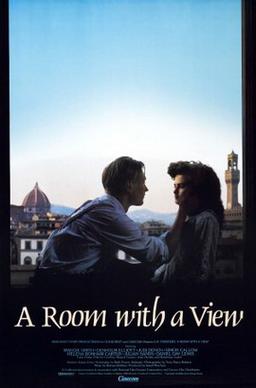Lucy In The Sky-With The Ivory-Merchant Production of E.M.
Forster’s A Room With A View In Mind
DVD Review
By Sam Lowell
A Room With A View, starring Helen Bonham Carter, Judi
Dench, and of course Maggie Smith, directed and produced by Ivory and Merchant fromthe1908
novel by E.M. Forster, 1985
No question for Europe and to the extent that Britain was
part of Europe (and is, note the Brexit vote recently) World War I was a
watershed between the old ideas of civil society and the new the old represented
in Britain by the cultural term “Victorian era,” reflecting certain strait is
the gate social norms and tons of sexual repression at least in public. And at
least in the public prints, and in public entertainments as well. But right at
the end of the era, right around the turn of the century, the turn of the 20th
century little cracks began to appear and the younger generation, the younger
generation whose male component would join the rest of the flower of European
manhood which would lay its head down in some foreboding fields of France, led
the way. Not too much however should be made, or rather over-made, of those
cracks witness the fate of poor Oscar Wilde who despite his sardonic and witty
jabs at late Victorian (and we will not forget when the old biddy Victoria died
the changeover to Edwardian era) wound up in Reading Gaol for acts one could
not speak of, for the love that dare not speak its name. Those small cracks
though are what E.M. Forster looked at in his 1908 novel A Room With A View of which the 1985 film adaptation by the famous
team of Ivory and Merchant being reviewed here is based on.
Of course the “room with the view” idea is both a concrete
expression of a physical location in arty Florence where the main characters
mix and match in a modest boarding house, a place where a coterie of British
citizens are taking a middle class version of the old Grand Tour and attempting
to get a room with a view of the famous and quite beautiful city and a more
idealistic concept of freedom, of breaking away from the past of stuffy
convention and routine. That tension between tradition, custom, the old ways
and the “jail break-out” of that late Victorian generation, or part of it drives
the film (and the book as well since Ivory-Merchant at least in regard to
Forster’s work are pretty faithful to the author’s storyline).
Here is how the small jail-break played out in this one.
Lucy, Lucy of the review headline, played rather nicely by a young and
precocious Helen Bonham Carter along with her strait is the gate sexually
repressed older cousin Charlotte as chaperone, played, inevitably played, by
the great character actor Maggie Smith, are among the guests at that boarding
house in Florence mentioned earlier. They, despite their fervent request, have
been given a room without a view, and seemed destined to have to put up with
that condition until two male fellow boarders, the Emersons, father and son,
switch rooms with them. Not only switch rooms with them but are the antithesis
of gentile society with some pretty advanced free-thinking ideas that old Emerson
has passed on to his son, George. His beautiful son George, played by Julian
Sloan, which set up the tormented love interest that drives the film as Lucy struggles
with her allegiances to the past and her desire to be a thoroughly modern
Millie. Needless to say in Florence no good can come of the budding romance,
and nothing does except that George makes his first rebuffed attempt at
smitten-hood (translation: He tried to kiss Lucy in an elysian field).
Fast forward, well, maybe not fast forward but forward with
Lucy back in England (you know Britain without Scotland, Ireland, and Wales in
those days) at her family’s country estate where she had after several earlier refusals
decided that she would marry an ardent suitor, the bookish snobbish Cecil (played
by a young Daniel Day-Lewis). Well if that is what she wants then okay. But
Cecil is strictly a bookworm, an intellectual looking to add Lucy to his
collection of books or something,
strictly a character in old-fashioned Victorian tradition (hell he
doesn’t even play tennis then the rage among the younger set). The beautiful
part though is when George, who along with his father has very conveniently
taken a small mansion in the neighborhood, puts serious doubts in Lucy’s mind
about her future with a bookworm, with a guy who won’t even look up at the sky
but keeps his nose in a book quoting odd-ball writers out of hand.
Eventually she gives Cecil his well-deserved walking papers
but even after that freedom break something is amiss, something is still
stirring in her suppressed passionate heart. Against all odd though and this is
the ending every ladies’ reading circle would be looking for is this kind of
novel and in a film plotline after speaking with old Emerson it turned out that
she loved, madly loved, George. Of course George and Lucy had to sneak off to
Florence to elope since breaking off one’s engagement to a well-established
figure and taking up with a free-spirit would not do, would just not do in high
society. What do you want to bet though they have a room with a view in that
boarding house they were staying at in Florence? A room with a view if they
ever get up from the downy billows.

No comments:
Post a Comment